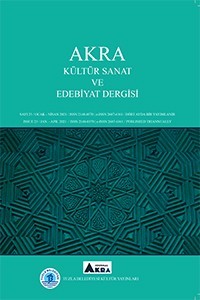“RİSÂLE Fİ’L-MANTIK” BAĞLAMINDA FAHREDDÎN ER-RÂZÎ’NİN MANTIĞA DAİR BAZI GÖRÜŞLERİ
Fahreddîn er-Râzî, Risâle fi’l-Mantık, Mantık Risaleleri, Aksi Müstevî, Aksi Nakîz, Kipler, Modalite
Fakhr al-Dîn al-Râzî’s Some Views on Logic in Case of “Risâlah fî al-Mantiq”
Fakhr al-Dîn al-Râzî, Risâlah fi al-Mantiq, Logical Treatises, Conversion, Contraposition, Modality,
___
- PROF. DR. MUSTAFA ALICI
- ISSN: 2148-0370
- Yayın Aralığı: Yılda 3 Sayı
- Başlangıç: 2013
- Yayıncı: Tuzla Belediyesi
REFAHİYE YÖRESİNDE BULUNAN ROMA VE BİZANS SİKKELERİ
SOSYOKÜLTÜREL DEĞİŞİM VE GÖÇ ÇAĞRIŞIMLARI: MUSTAFA KUTLU ÖYKÜLERİNDE YOLDA OLMAK
KATUNA'DA DOKUZ AY (Türk Eğitim Tarihi Açısından, Eğitimin Öğeleri Üzerine Bir İnceleme)
“RİSÂLE Fİ’L-MANTIK” BAĞLAMINDA FAHREDDÎN ER-RÂZÎ’NİN MANTIĞA DAİR BAZI GÖRÜŞLERİ
ERZURUMLU İBRAHİM HAKKI’NIN EĞİTİM ANLAYIŞI
ÂŞIK VEYSEL’İN ŞİİRLERİNDE SOSYAL ELEŞTİRİ
DİNDAR DEĞİL MANEVİYATÇIYIM: POSTMODERN DİN BİLİMLERİNDE MANEVİYAT- DİNDARLIK TARTIŞMALARI
OSMANLI DEVLETİ’NDE UYGULANAN İÇKİ YASAĞININ FIKRALARA YANSIMASI
Esma ŞİMŞEK, Ömer Faruk ELALTUNTAŞ
MEDRESE-TEKKE BÜTÜNLÜĞÜNDE YETİŞMİŞ BİR ÂLİM TİPİ: İMAM GAZZÂLÎ ÖRNEĞİ
ÇAĞDAŞ KAZAK TÜRK EDEBİYATI YAZARI BERDİBEK SОKPAKBAYEV’İN HAYATI EDEBİ KİŞİLİĞİ VE ESERLERİ
